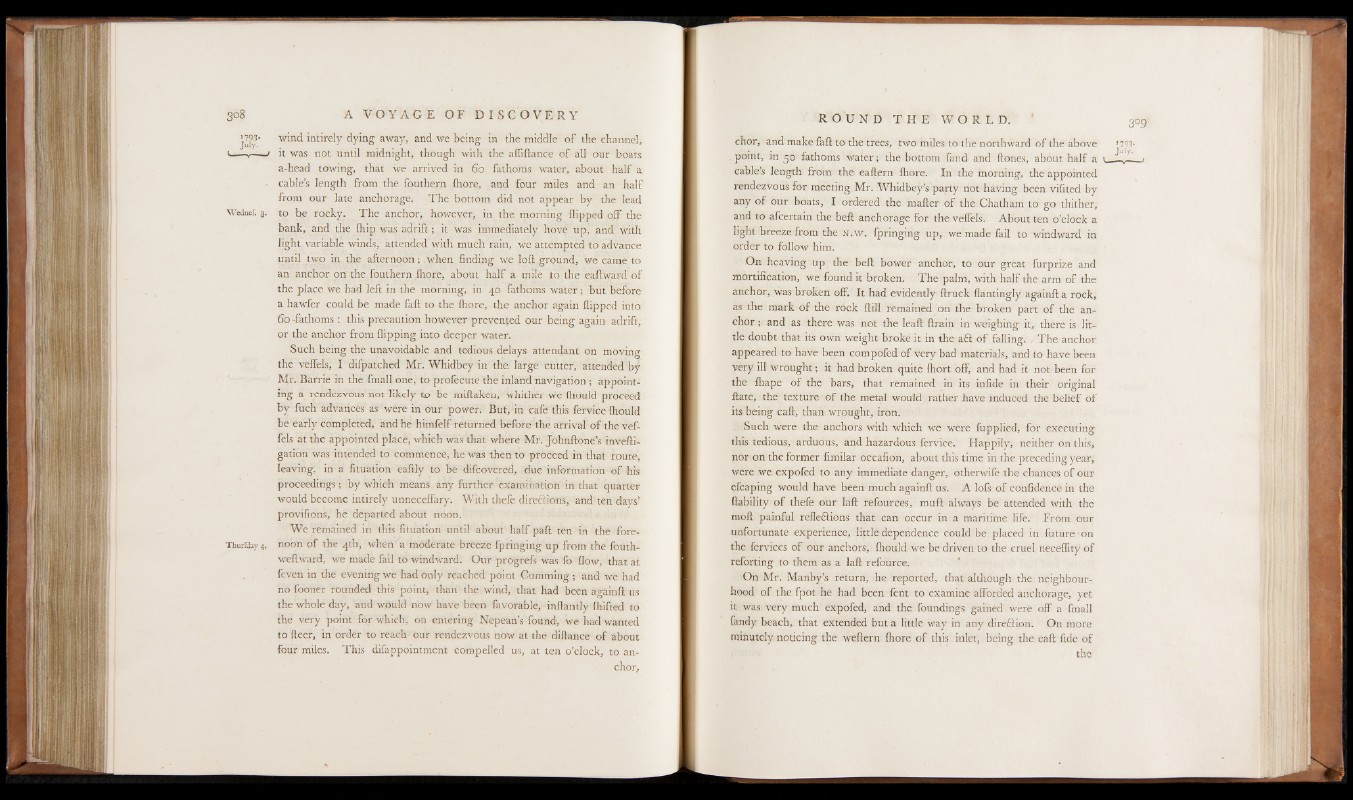
3 °8 A V O Y A G E OF D I S C O V E R Y
‘ 793- wind intirely dying away, and we being in the middle o f the channel,
>— - ,---- < it was not until midnight, though with the affiftance of-all our boats
a-head towing, that we arrived in 60 fathoms water, about half el
• cable’s length from the fouthern Ihore, and four miles and an half
from our late anchorage. The bottom did not appear by the lead
Wedner. 3. to be rocky. The anchor, however, in the morning flipped off the
bank, and the fhip was adrift ; it was immediately hove up, and with
light variable winds, attended with much rain, we attempted to advance
until two in the afternoon; when finding we loft.ground, we came to
an anchor on the fouthern .fhore, about half a mile to the eaftward of
the place we had left in the morning, in 40 fathoms watér ; but before
a hawfer could be made fall to the fhore, the anchor again flipped into
60-fathoms : this precaution however prevented our being again adrift,
or the anchor from flipping into deeper water.
Such being the unavoidable and tedious delays attendant on moving
the veffels, I difpatched Mr. Whidbey in the large cutter, attended by
Mr. Barrie in the fmall one, to profecute the inland navigation ; appointing
a rendezvous not likely to be miftaken, whither we fhould proceed
by fuch advances as were in our power. But, in cafe this fervice fhould
be early completed, and he himfelf returned before the arrival o f the veffels
at the appointed place, which was that where Mr. Johnftpnè’s invefti-
gation was intended to commence; he was then to proceed in that route,
leaving, in a fituation eafily to be difcovered, due information of his
proceedings ; by which means any further examination in that quarter
would become intirely unneceffary. With thefe directions, and ten days’
provifions, he departed about noon.
We remained in this fituation until about half pàft ten in the fore-
Thurfday 4, noon of the 4th, when a moderate breeze fpringing up from the fouth-
weftward, we made fail to windward. Our progrefs was fo flow, that at
feven in the evening we had only reached point Curnming ; and we had
no fooner rounded this point, than the wind, that had been againft us
the whole day, and would now have been favorable, inftantly {biffed to
the very point for which, on entering Nepean’s found, we had wanted
to fleer, in order to reach our rendezvous now at the diftance of about
four miles. This difappointment Compelled us, at ten o’clock, to anchor,
R O U N D T H E W O R L D . 3°9
chor, and make faft to the trees, two miles to the northward of the above 1793-
point, in go fathoms water; the bottom fand and ftones, about half a ■ ^ - -
cable s length from the eaftern fhore. In the morning, the appointed
rendezvous for meeting Mr. Whidbey’s party not having been vifited by
any o f our boats, I ordered the mafter of the Chatham to go thither,
and to afcertain the beft anchorage for the veffels. About ten o’clock a
light breeze from the n.w . fpringing up, we made fail to windward in
order to follow him.
On heaving up the beft bower anchor, to our great furprize and
mortification, we found it broken. The palm, with half the arm of the
anchor, was broken off. It had evidently ftruck flantingly againft a rock,
as the mark o f the rock ftill remained on the broken part o f the anchor
; and as there was not the leaf! ftrain in weighing it, there is little
doubt that its own weight broke it in the aft of falling. , The anchor
appeared to have been compofed of very bad materials, and to have been
very ill wrought; it had broken quite fhort off, and had it not- been for
the fhape of the bars, that remained in its infide in their original
ftate, the texture o f the metal would rather have induced the belief of
its-being call, than wrought, iron.
Such were the anchors with which we were fupplied, for executing
this tedious, arduous, and hazardous fervice. Happily, neither on this,
nor on the former fimilar occafion, about this time in the preceding year,
were we expofed to any immediate danger, otherwife the chances of our
efcaping would have been much againft us. A Iofs of confidence in the
(lability of thefe our laft refources, mufl always be attended with the
moft painful refleflions that can occur in a maritime life. From our
unfortunate experience, little dependence could be placed in future on
the fervices of our anchors, fhould we be driven to the cruel neceffity of
reforting to them as a laft refource.
On Mr. Manby’s return, he reported, that although the neighbourhood
o f the fpot he had been fent to examine afforded anchorage, yet
it was very much expofed, and the foundings gained were off a fmall
fandy beach, that extended but a little way in any direction. On more
minutely noticing the weftern fhore of this inlet, being the eaft fide of
the